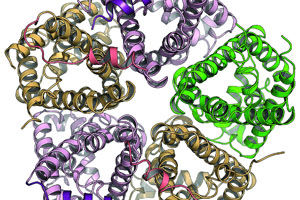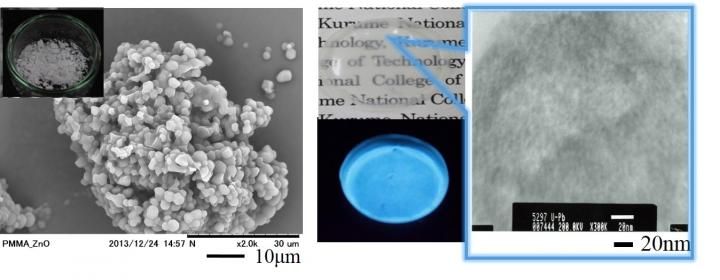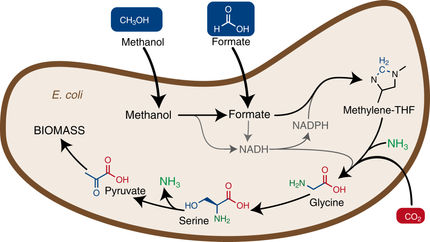pH Values Control Formic Acid Metabolism in Bacterium
Discovery of New Dual Function of Transport Protein
Formate, the salt of formic acid, is an important product of metabolism in bacteria and – in contrast to human metabolism – a preliminary stage of the gas carbon dioxide, which is released in the combustion of sugar. Enterobacteriaceae, a large family of bacteria including the intestinal bacterium Escherichia coli as well as pathogens like Vibrio cholerae and Salmonella typhimurium, possess the formate channel FocA, a specialized transport protein that transports the negatively charged ion of the formic acid over the cell membrane of the bacteria.

The formate channel FocA, a membrane protein, in high resolution.
Institute of Organic Chemistry and Biochemistry
The distinctive feature of the channel protein is a switching mechanism for closing that is triggered by a drop in the extracellular pH value: When the pH value is high, the protein functions as a passive channel that allows formate anions to flow out of the cell, whereas a drop in pH value makes the protein into a pump that actively takes in formate from the environment. Dr. Wei Lü and Juan Du from the research group of Prof. Dr. Oliver Einsle, Institute of Organic Chemistry and Biochemistry of the University of Freiburg, succeeded in isolating and crystallizing FocA from the bacterium Salmonella typhimurium at a low pH value. In a joint project with Tobias Wacker from the Emmy Noether Junior Research Group of Dr. Susana Andrade from the same institute, the researchers observed directly how these channels close at a low pH value, a process that was previously only postulated.
A dual function of this kind has never been observed before in any transport protein. The high resolution spatial structure of the pentameric protein shows how the end of the protein chain places itself across the entire transport channel stretching over the bacterial membrane, thus blocking it and preventing the formate ions from passing through the membrane. At high pH values, where FocA functions as a passive channel, these protein domains are in disorder. The researchers integrated FocA into artificial membranes in the laboratory. Electrodes were used to measure the electric current created by the transport of the formate ions at various pH values.
Original publication
Wei Lü, Juan Du, Tobias Wacker, Elke-Gerbig-Smentek, Susana L.A. Andrade, Oliver Einsle (2011) pH-Dependent Gating in a FocA Formate Channel. Science (in press)
Most read news
Original publication
Wei Lü, Juan Du, Tobias Wacker, Elke-Gerbig-Smentek, Susana L.A. Andrade, Oliver Einsle (2011) pH-Dependent Gating in a FocA Formate Channel. Science (in press)
Organizations
Other news from the department science

Get the chemical industry in your inbox
By submitting this form you agree that LUMITOS AG will send you the newsletter(s) selected above by email. Your data will not be passed on to third parties. Your data will be stored and processed in accordance with our data protection regulations. LUMITOS may contact you by email for the purpose of advertising or market and opinion surveys. You can revoke your consent at any time without giving reasons to LUMITOS AG, Ernst-Augustin-Str. 2, 12489 Berlin, Germany or by e-mail at revoke@lumitos.com with effect for the future. In addition, each email contains a link to unsubscribe from the corresponding newsletter.
Most read news
More news from our other portals
Last viewed contents
Mefenamic_acid
Category:Alpha_blockers

Semiconductor nanoparticles show high luminescence in a polymer matrix
Bitter_orange
Therapeutic_food
Methacholine
Psilocybin

How the detergent of the atmosphere is regenerated - Juelich troposphere researchers demonstrate effective recycling of radicals during isoprene degradation


























































